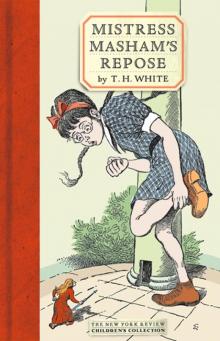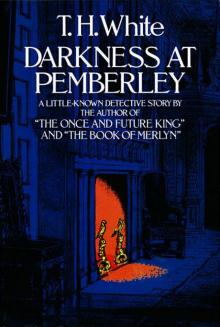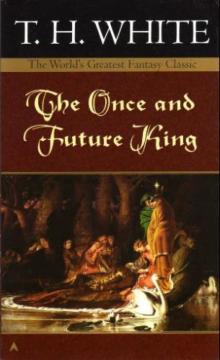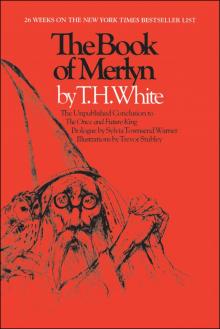- Home
- T. H. White
Mistress Masham's Repose Page 19
Mistress Masham's Repose Read online
Page 19
The butler carried in a telephone in the form of a plastic Derby winner, and the Lord Lieutenant began to shout commands into its mouth, occasionally applying its tail to his ear.
“Is that the Exchange? Where is the Exchange? Why not? Well then, why didn’t you say so? Get me Mr. Winston Churchill. Certainly I said Mr. Winston Churchill. Give him to me at once. Who the deuce are you, Sir? I tell you I’m the Lord Lieutenant. No, I’m not. Yes, you are. An imposter? So are you. That settled him. What? My good man, what’s the use of Mr. Attlee? Get me Mr. Churchill, like I said.”
CHAPTER XXIX
WELL, they dissuaded him from recalling Mr. Churchill at last. After that, he wanted to have General Eisenhower, Field Marshal Montgomery or Scotland Yard. The Professor cunningly went aside and wrote a message, which he persuaded Captain to deliver, saying that though the Far Eastern Battle Fleet might be very useful, yet they themselves, being on the spot, would be sure to get there sooner. The Lord Lieutenant was delighted by this second example of canine sagacity, and agreed to send at once for P. C. Dumbledum. The posse was collected without further argument.
It set off to the rescue in the early hours of the morning, much excited. The Lord Lieutenant was on a horse, the Professor was on his tricycle, and P. C. Dumbledum was in a wheelbarrow, owing to the lumbago. This was propelled by his wife, a woman of strong character, who was also the village postmistress.
“Faster, Mrs. Dumbledum! Faster, Professor! How can I gallop, old boy and Mrs., when I have to keep up with a wheelbarrow?”
“Faster, me Lord, I cannot go, but ride you on ahead with the gentleman, and Dumbledum shall not be far behind!”
“Faster, indeed! How can anybody go fast with that confounded horse stamping on everything? Have you brought the warrant, the habeas corpus, the de heretico comburendo?”
“No, no, no. I tell you it will be sufficient for Dumbledum to produce his truncheon. It has the Royal Arms painted on it, dated 1807. How are you, Dumbledum? Can you move at all? Are you still conscious?”
“Oh, me Lord!”
“There you are, you see. He can produce his truncheon. I wish I had a badge to wear, though, or a lassoo or something. Never mind, I can crack my whip. I say! Good Lord! Old boy, I say, can I see something white? Look there, ahead of us! Goodness! Oh, my, do you believe in ghosts?”
“No, I don’t.”
“I don’t either, really. Could we keep closer together?”
“There is something white. I can see it.”
“Good Lord! I say, shall we go home? I mean, we could come again in the mornin’. Now, don’t tinkle your bell so much. You might frighten it.
“Take horses,” added the Lord Lieutenant faintly. “Horses believe in ghosts, you know. In fact, they frequently are ghosts. Headless ones, with hearses and that. Don’t you think it would be best if we ... I say, do you think it is walkin’? You know, out for a glide? Do stop tinklin’ your bell, old boy. I mean, if we could just sort of pass by without lookin’ at it, it might go on with its walk, mightn’t it?”
“There is a hound with it.”
“Yes, I see it. Now, take hounds. Hounds are frequently ghosts also. Headless, of course, with the hearse, and generally black. I say, must we keep talking about hearses? Oh, Lord, do you feel all right?”
“It is Mrs. Noakes.”
It was, and Captain was with her, as she limped on valiantly through the long grass, for the second time during that long day. He had returned home at once, after delivering the two vital messages so magnificently.
“Mrs. Noakes! Hurrah! Hullo, Mrs. Noakes! Bless me, you did give us a turn! We thought you were a ghost, only, of course, we don’t believe in them. Well, well, well! I think we ought to have a biscuit now, to revive us after the scare. Fortunately, I have brought my biscuit box, which I take with me when I am out huntin’. I keep them in this chromium steeplechaser here, for safety. You just turn his tail to the left, like this, and his saddle swings open, like that, and a kind of machine inside him gives you a biscuit, like this, oh, I’m sorry, never mind, we will have some others when we get home, and of course he plays ‘Reynard the Fox.’ Convenient, isn’t it?”
They left the biscuits where the machine had scattered them, in a wide circle, and hurried on beside the new recruit. They passed by peeping fox and shadowy badger, by inquisitive rabbit and soft-winged owl. The stars of the short summer night began to pale as they went and the small wind that goes before the dawn rustled the treetops with its single sigh. They could already see the outline of the cottage chimney, dark against the dimness, when the second ghost appeared.
It was outside the cottage itself, dancing gravely in the dew. When it saw Mrs. Noakes it gave a shout of joy, and rushed to fold her to its bosom.
“Maria, my lamb! So they ain’t cut your throat arter all! Oh, dearie me, I’ve come all over queer of a sudden, and I can’t find me ankercher!
“Who-hoo-hoo,” added Cook, weeping happily down Maria’s neck, “and you a-dancing in the dewdrops without any shoes on, my cherubim, and in the pore Professor’s nightie! Glory hallelujah, is what I say, begging His Lordship’s pardon, I’m sure, but such a day as it’s been for old bones with this and that is more than some could suffer the endurance of with whatso willingness as they was sustained by whithersoever! And, oh, my precious pet, them villyans that was arter you, they may be still about us notwithstanding!”
“We got ’em,” said Maria. “We ...”
The Professor coughed.
“I got ’em,” said Maria, catching on. “I locked them in the cellar. Come and see.”
The Professor used to keep his homemade wine in the wooden coal shed, so he hurried the party round to the back of the cottages, to see what damage had been done. There was profound silence inside.
“Now then, Dumbledum. Produce your truncheon. Good Lord, he’s left it behind. Never mind, produce your armlet. It has blue stripes on it. Yes, yes. It will do splendidly. Mrs. Dumbledum, tip him out of the barrow. Are you alive, Dumbledum? Good, good. Try to prop him up, Professor. Don’t groan so, Dumbledum, or it won’t be a surprise. Now then, Mrs. Noakes, you open the door. Unlock it first, of course. Maria, take horses. I mean, take my horse. I mean, hold it. You hold it by this thing here. That’s right. I shall stand behind you, Mrs. Noakes, with my huntin’ crop, in case they turn nasty. Excellent. Now then, when I say One, unlock it, when I saw Two, throw it open. Then we shall all rush in and overpower them, or they will all rush out and overpower us, of course, since it depends how it happens, and Dumbledum must do his duty. Don’t let him fall down, Professor. He is sagging in the middle. That’s better. Now, are we all ready? Keep calm, everybody. Don’t get excited. I shall begin to count in half a minute, when I can get my breath. Desperate characters. Oh, Lord! On the word Two. One, two, three, four, five, six, seven, eight ...”
The door swung open, revealing the silent prisoners seated side by side on a barrel. They had so many expressions on their faces, of anxiety, of outraged dignity, and, yes, of triumph, that their features moved like water with the wind on it, formless. The Vicar’s mouth was fluttering at the corner. He could not stop it.
“Now,” said the Lord Lieutenant, taking control of the situation, “I arrest you in the name of the Lord. Dumbledum, the handcuffs.”
“I protest,” said the Vicar. He was husky, scarlet in the face and shaky. “I insist on making a statement. Before witnesses. This barrel contains several hundred people six inches high. Found by me and Miss Brown on our own property. We insist on opening the barrel before witnesses.”
“D.T.’s!”
“I am a beneficed clergyman of the Church of England, wrongfully detained in this coal shed, and I insist ...”
“Now, now,” said the Lord Lieutenant, “none of that.”
The Vicar pushed him away with a fumbling gesture.
“But you can’t push me, sir! I’m the Lord Lieutenant. You have insulted the King’s Uniform. This blue-and-white thing of D
umbledum’s. It’s an indictable offense. Probably High Treason!”
“We insist,” cried Miss Brown in a shrill voice, “on opening our barrel. Our own barrel. We call you to witness!”
They trundled it out with painful care, and knocked the lid in.
It was empty.
“D.T.’s,” said the Lord Lieutenant. “Obvious case. Think they see little men wanderin’ about. Blue elephants and that. Well, well, sad thing really, I mean considerin’. We shall have to arrest them, of course. Can you move Dumbledum, Professor? That’s right. I give them in charge for High Treason, drunk and disorderly, obstructing the police in the discharge of their duties, that’s the push they gave me, and for attempted manslaughter of Maria, though that seems hardly accurate, as it ought to be girlslaughter, but perhaps we can think of a better word on the way home. Yes, and everything they say may be used in evidence against us, so you can’t say I didn’t warn them. Now then, Dumbledum. Shove him along, Professor. Clap ’em in irons. Hanging too good for them. I say, what an exciting evening! Hold up, Dumbledum. Here, give me the handcuffs. I’ll do it. Look, you just put your hands in this nickel stirrup thing for interest’s sake, like that, and I press this knob, like this, and there must be some sort of machine in it, I suppose, because a kind of bar comes out to lock you up, like that, good Lord, it worked, but unfortunately it doesn’t play anything at all. Ingenious, isn’t it?”
“You stole them!” screamed the Vicar and Miss Brown, recovering simultaneously, and, already handcuffed together, they clutched each other by the throat.
Mrs. Dumbledum removed them in the wheelbarrow, with the aid of the Lord Lieutenant.
In case you would like to know what happened to them afterward, perhaps this is the best place to tell it. Most of the charges preferred by their captor were found to be valueless, much to his annoyance, but the cruel treatment of their ward was proved to the hilt, and it was also discovered that they had been embezzling the little money she ought to have had. They got heavy sentences for these things. The last that was seen of them in the Northampton district was when they were taken to jail in a third-class carriage. The Vicar crouched in a corner seat, holding a two-day-old copy of the Daily Express in front of his face, upside down, with trembling fingers.
It was reported some years later that they had married each other, which was about the worst fate that could befall them, and one of the locals who came back from a holiday at Whitby said that he had seen them in that district, being booed by the small boys, refused drinks by the publicans, and made to walk by the bus conductors. The Professor does not think they would really have murdered our heroine, but it served them right for all that, say I.
Maria told the others her own story in the gamekeeper’s cottage, over a filling breakfast of boiled water and the remaining bloater.
“The Schoolmaster got here long before they did,” she explained, “but you had locked the door and he couldn’t reach the keyhole. He managed to scramble up the plum tree to the window sill, but then the glass was too thick for him to break, so he had to go down again for a stirrup, and he managed to smash it, in the end, with that. And luckily the doors inside were all open, and he told me I had got to hide, and we went all round looking for a place, and in the end he said it would be best in the wood. And we were going out when he looked into the coal shed, and he said it was a pity I couldn’t hide in a barrel like him, and he went in and knocked the barrels with the stirrup, and one was hollow, and he had a brilliant idea. It was simply brilliant. And we could hear them quarreling near the Byng Monument, and I unlocked the front door, and we put your candle so that it would light the steps, and we opened the cellar door, and I hid behind it. And in the end the People arrived, all skirmishing and galloping on rats, and he drew them up on the step so that they would be seen, and when those two silly asses opened the gate he made them all shout rude remarks and wave their swords like anything! And Miss Brown and the Vicar forgot about me, and they ran to and fro like mad things making grabs, and the People kept withdrawing according to plan, without being caught, and in the end they rushed into the coal shed, and Miss Brown and the Vicar rushed in after them. And I slammed the door, and I locked it, and I danced on the back step. And I could hear them striking matches and cursing. And of course the People had climbed into the barrel, through the bung hole, where they could not reach! And that was the plan. Wasn’t it terrific? But I got it better, you know. I found a brace and bit they were carrying, and I went round behind the shed, and I drilled three holes, and it was a three-quarter-inch bit, and they went right through the wall and through the barrel, and the People all scrambled out by the back! Wasn’t it a sell? Wasn’t it clever of us? As a matter of fact, they are hiding out there in the gooseberry bushes, this minute....”
She got up hastily at the thought of her friends, and went gladly to the window, where she waved the bloater.
From outside, in the golden sunrise there came a tinkling cheer.
CHAPTER XXX
IT was nearly five months later that a tired old gentleman in a curly bowler hat and a faded ulster was wheeling his tricycle up the Grand Avenue of Malplaquet, in the snow. A tired young lady was sitting on the saddle, clutching an enormous parcel, and the bare trees were thick with icing. The sun was setting in a blaze of scarlet, tinting the white expanse with a saffron tinge between the purple shadows. Various robins hopped about in the correct manner. It was Christmas Day.
They had been long away, staying at a poor hostel in the great metropolis of Northampton, for the Vicar’s trial, and now Maria was coming home to the palace of her ancestors, a free girl. She was to have no more governesses or Algebra. It had been arranged that the Professor should teach her instead, at an inclusive fee of sixpence quarterly, which would be of assistance in his housekeeping. They were tired with the excitements of the trial, with the difficult shopping they had done the day before, and with the long trudge from Northampton, taken to save the fare. Also they were hungry from doing without dinner, for they had saved on that too, in order to keep everything for the shopping, and the Professor was footsore, and Maria was cold.
“Dear me,” he said. “Here is the Triumphal Arch at last. Only another mile and then I can sit down. It looks noble with the sun behind it.”
The Triumphal Arch was twice as big as the Arc de Triomphe. It had been put up to welcome the First Duke, when he came back after conquering the Nabob of Ooze, at Marzipan, in 1707.
“You scarcely notice it is falling down, not from a distance.”
“No.”
“I hope the People will be safe.”
“I hope so.”
“Do your feet ache?”
“Very much.”
“Do you know,” said the Professor later, “I fear I must be getting old. I seem to need food nowadays, and a chair to sit on. It would be nice to be able to afford them. Well, well, we cannot have everything. I must say it is nice to have a tricycle. I forget who gave it to me. It was a thoughtful gift. Now you mention it, however, I recollect that I found it in a ditch. There must be several people who have neither food nor tricycles, when one comes to think of it, so one is lucky, really, compared with them. And this new sixpence a quarter will go very far, very far. I shall be able to buy the penny fishhook, and all sorts of luxuries. Quite a plutocrat. Dear me, I believe we shall shortly be able to go freewheel, downhill.”
“There is something in the Arch.”
“So there is. Bless me, it seems to be barred.”
“I think it is something lovely!”
They quickened their lagging steps, to find out what it was.
In the enormous archway there was a banner. It was at least as large as a pocket handkerchief, high enough for them to pass underneath.
It said:
WELCOME HOME!
A LOYAL GREETING FROM LILLIPUT
TO THEIR MARIA!
AND TO HER ERUDITE FRIEND!
VENI, VIDI, VICI!
SIC SEMPER TYRANNI
S!
The band was drawn up underneath, dressed in their best eighteenth-century clothes and three-cornered hats, with a lantern on a pole, so that they looked exactly like the Waits in a Christmas card. The flautists had red mittens to keep their blue fingers warm, and they licked their freezing lips so that they would be able to blow. As soon as the travelers were within earshot, the whole orchestra burst out as fortissimo as they could with “See, the Conquering Heroes Come!”
There was the usual illuminated Address, and, while the Schoolmaster was reading it aloud, a party of sailors under the Admiral swarmed up the tricycle to attach a harness of horsehair ropes. If there had been any horses they would have taken them out, but, as there were none, they had to do without. Then, with the Address concluded and the band marching in front to the strains of “Rule Britannia,” the haulage party set to work, for the rest of the way was fortunately downhill, and Maria was drawn home in triumph by her devoted tenants! The Professor marched behind with quite a springy pace. He was charmed with the Latin on the banner, which had been put in specially for him.
When they reached the North Front, the whole of Lilliput was drawn up on the top step, in their furs and comforters, and Cook stood in the middle with a second banner of red flannel and cotton wool, which had been used in the old times when the dukes came home from school. It said: HAPPY HOLIDAYS! As soon as the cortege arrived at the steps, all the ladies of Lilliput produced handkerchiefs and fluttered them, all the children removed their hats, as they had been instructed to do, to give three shrill huzzas for the Squire, and, in the hush that followed, the bells rang out Noel!

 The Once and Future King (#1-4)
The Once and Future King (#1-4) Once & Future King 05 - The Book of Merlyn
Once & Future King 05 - The Book of Merlyn Mistress Masham's Repose
Mistress Masham's Repose Darkness at Pemberley
Darkness at Pemberley The Once and Future King
The Once and Future King The Book of Merlyn
The Book of Merlyn Candle in the Wind
Candle in the Wind